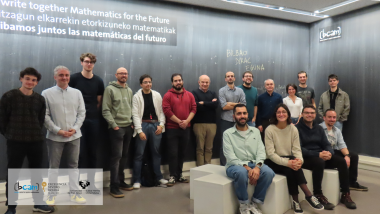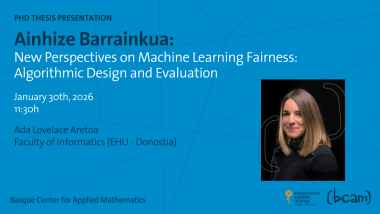Lander Rodriguez will defend his thesis on Thursday, October 9th
The defence will take place at EHU Leioa Campus at 10:30
Lander Rodríguez is a researcher in applied mathematics with a focus on health sciences, while also maintaining a strong interest in sports and other fields. He holds a Bachelor’s degree in Industrial Engineering and a Master’s degree in Industrial Engineering, both from the School of Engineering of Bilbao. After several years working at a research center dedicated to machine tools, he realized that his true passion lies in mathematics—particularly statistics and machine learning—and their practical applications. This led him to begin his PhD in late 2021 at BCAM in collaboration with the University of the Basque Country (UPV/EHU).
His thesis, titled “Analysis of the COVID-19 pandemic in the Basque Country and characterization of the infection profiles,” is supervised by Prof. Irantzu Barrio (EHU&BCAM) and Dr. José María Quintana López (Biosistemak Institute for Health Systems Research). It is scheduled to be defended on October 9th, 2025, at EHU Leioa Campus, at 10:30a.m.
On behalf of all members of BCAM, we would like to wish him all the best for the future, both professionally and personally.
Abstract
This thesis presents a comprehensive analysis of the COVID-19 pandemic in the Basque Country, using advanced statistical methods to capture its complexity and extract lessons for future health crises. Based on a database that included all SARS-CoV-2 adult infections that occurred in the Basque Country from March 1, 2020 until January 9, 2022, the research applied Bayesian spatio-temporal modeling to examine the geographical and temporal variation of infections, hospitalizations, deaths, and reinfections and the factors influencing them. Results revealed socioeconomically disadvantaged regions faced higher risks of severe outcomes, while rural areas may have faced barriers to hospital access.
In parallel, clinical phenotyping was performed through clustering techniques based on basic patient data, identifying meaningful patient profiles within the general COVID-19 population, among emergency department patients, and among reinfected individuals. These phenotypes, developed in an unsupervised manner, were associated with the clinical outcomes of the disease, suggesting the potential prognosis of patients can be anticipated through a simple classification system. This could be really valuable during new pandemics, as the most vulnerable groups could be rapidly identified, even before outcomes were available. In addition, the phenotypes proved stable across different pandemic phases, suggesting an initial segregation of the phenotypes is still valid at different stages of the pandemic. Reinfection analyses uncovered behavioral and demographic differences that influenced both the timing and severity of secondary infections.
Altogether, this thesis provided an in-depth analysis of the COVID-19 pandemic in the Basque Country. While the approaches presented were tested locally, they have the potential to be used in other regions and other pandemics, enhancing our preparation for potential future threats.
Related news




